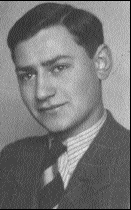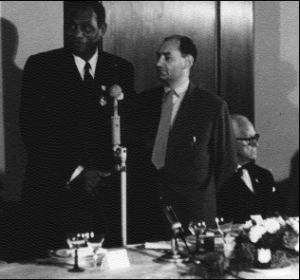An interview with Prisoner Number 12,909
by Graeme Atkinson
first appeared in Searchlight No 281, November 1998
WERNER HÄNDLER was born in 1920 in Bismarckhütte, Upper Silesia, which became part of Poland under the terms of the post-First World War Versailles Treaty. His family moved to the then German – but now Polish – remote mountain town of Hirschberg, where his father owned what Werner calls “every boy’s dream”, a toy shop.

Growing up in an observant but liberal Jewish family, Werner went to the local grammar school and became a keen skier. His childhood was that of any other German youngster and was a happy one. The handover of power to the Nazis in January 1933, when he was 13 years old, changed all that.
Says Werner: “The first really shock ing proof of what Nazi terrorism meant was the so-called Night of the Long Knives on 30 June 1934, when Hitler ordered the liquidation of almost a thousand leaders of the Nazi SA brownshirts. This event proved that there was no law and justice any more in Germany”.
In Werner’s opinion, the SA stormtroops were victims of their own naivete and gullibility, believing Hitler’s propaganda about a “G erman socialism” and being convinced that they would be the main beneficiaries of the Nazis’ much-vaunted “national revolution”: “They swallowed the propaganda of the National Socialist German Workers Party. Every word of this name, a lie!”
The violent antisemitism of the Nazis had been sporadic until then when, for the first time, Hirschberg and its small Jewish population got a taste of what was to come. Werner recalls: “On that evening, five Jewish men were arrested and then set free. They were ‘shot while trying to escape’ [auf der Flucht erschoßen]. My father was responsible for the Jewish cemetery and he collected the corpses, washed them and buried them.”
My second direct experience of their terror was four years later on 9 November 1938 when, in retaliation for the assassination of a German diplomat in Paris, the Nazis organised a massive pogrom in which synagogues all over Germany were set ablaze and tens of thousands of Jews rounded up.
“This pogrom was ordered and organised from start to finish by the government and the Nazi Party,” says Werner. “In Hirschberg, the synagogue was not torched because setting it alight would have set fire to adjoining buildings. Nevertheless, it was completely destroyed.” The pogrom did not enlist the active support of local people. “In fact,” Werner explains, “I did not feel personally afraid. I rode through the town on my bicycle and the only people there were the Nazis. The town was quiet. There were no attacks on people and the shops were not attacked because those owned by Jews, including my father’s, had already been forcibly ‘Aryanised’.” The horrific truth and impact of the night’s events only began to unfold in the following days as reports of what had happened in the major cities began to reach Hirschberg.
The arrests did, however, take place. Police came for Werner’s father and took him away, obeying an order that all men aged between 18 and 60 should be arrested and taken to concentration camps.
Werner, then only just 18 and an apprentice joiner,
escaped the first wave of arrests but was later picked up. “The local police deliberately forgot me but were later given special orders to arrest me and came three days later … this was the beginning of my life’s apprenticeship.” Werner was briefly united with his father in nearby Liegnitz and they were transported to the Sachsenhausen concentration camp. “The existence of this place and Dachau and Buchenwald were already well known.”
At Sachsenhausen, the trains arrived in the night and were emptied violently. The prisoners were brutally beaten by the Nazi guards, something that the Prussian police had desisted from doing on the journey there. The prisoners were forced to run through the camp gates at the double.
On the bleak camp Appelplatz. (roll call square), standing in the freezing cold, Werner and his father were allotted their numbers. “Our heads were shaved. My father got the number 12,821. I got 12,909.”
“At first, I was put to work in the brickworks where they were supposed to make the bricks for the future German victory capital, Germania, but they didn’t know what to do with us. Eight thousand prisoners were newly arrived and things were chaotic. I ended up shovelling sand from one place to another and back again.”
Soon Werner was transferred to a work group outside the camp, making wooden joists. “Here, I was put among a group of experienced political prisoners – Communists, trades unionists and Social Democrats – who taught me how everything was a matter of life and death.”
Werner insists that up to Reichspogrommnacht (Kristallnacht) the majority of German Jews were not aware of the peril about to befall them. “But”, he says, “they were taught, because, in retrospect one can see that Nazi policy towards the Jews followed what the distinguished German historian Dr Kurt Pätzold characterised as three phases: Verfolgung, Vertreibung, Vernichtung – persecution, expulsion and annihilation.”
Werner was a prisoner during the period of persecution and expulsion. Luckily, it was still possible to escape from the mounting horror. He was released at the end of 1938 after his mother went to the Gestapo in Hirschberg and showed them boat tickets for Panama. “On my release, I had to sign a document that said that I would tell nobody what I had seen in the camp and that I was going to leave Germany. I would have signed anything to get out.”
By now, Werner had grasped clearly what fascism really meant. He had had excellent teachers on his outside work detail, “men like the former Communist MP and First World War army officer, Müller, who explained to me how the international powers had caved in to the Nazis and had stood aside while Hitler was installing his dictatorship.”
“These men”, recalls Werner, “gave me two vital pieces of advice. Firstly, ‘find and keep to guys like us’ … and I did. A lesson for my life. Secondly, tell everybody, wherever you go, that we are on the verge of war.”
On 13 April 1939, on the ferry to England, Werner spoke his first English word: war. The sailors on the boat were stubbornly disbelieving, still under the influence of Chamberlain’s vacuous “Peace in our Time” policy.
Summing up his brief period in the concentration camp, Werner emphasises his own good fortune. “It was an organised terror system, a regime of torture and death. On 14 November 1938, Leopold Simon, the father of my wife, who I married in 1945, was clubbed to death in Buchenwald because, as a former German army officer, he refused to be treated in that way. He did not understand or refused to understand what the Nazi system was. They sent his ashes to his widow and demanded 56 Reichsmark for his burial.”
Werner says that prewar prisoners were shot, clubbed and hanged but not systematically starved to death or gassed. “Treblinka, Maidanek, Auschwitz all came later and with them the industrialised murder of millions.”
Werner’s elder brother and sister escaped the Holocaust by leaving for Uruguay. “Generally, though, the Jews could leave but could not get in anywhere.” Werner came to England. For his parents escape, tragically, was impossible. They were taken to Auschwitz and were murdered there. “In 1948, I was able to go to Poland and finally learn what had happened to them.”
Incredibly, despite being a persecuted German-Jewish victim of Hitler’s fascism, “an asylum-seeker fleeing Nazi oppression”, Werner was interned in 1940 in the Kitchener Camp at Ramsgate by the British author ities. “The internment, though, was easy and we were later transferred to Canada where I worked as a joiner.”
During the war, Werner tried to enlist in the British Army but was refused – “maybe they thought I was too political, too left-wing.” He returned to England to help as a war worker. Werner is proud of his membership of his first trade union, the Amalgamated Society of Woodworkers (ASW), in which he followed his trade as a joiner.

When he announced his intention, in 1945, to return to Germany, his fellow union members in the ASW’s Camden Town branch held a collection for his homeward journey and encouraged him to “go there and fight to ensure that these fascist bastards never raise their heads again”.
Returning to war-devastated Germany, Werner became a radio journalist, trained by the British, first in Hamburg and later in Berlin. When the Cold War started Werner was relieved of his post, but when the newly founded German Democratic Republic established its radio station, Radio Berlin International, he joined it and worked abroad as a foreign newsman and sports journalist in Rome and in West Germany during the adoption of Willy Brandt’s Ostpolitik.
He had no hesitation about going back to Germany: “It was my cultural back ground. Jews have lived there for over two thousand years. Why should I not be a Jew and a German? Also, I hoped – against hope – that my parents might still be alive.”
Wer ner has remained
Werner has remained intensely proud of his Jewish origins and his combative anti-fascist and socialist principles. When he retired from radio journalism, he did not give up the struggle. Exactly ten years ago, two members of Searchlight’s present staff had the great honour of having him as their guide on a visit by a delegation of anti-fascists from western Europe to the Sachsenhausen memorial. They still treasure this experience.
Today, Werner still fights for the interests of Sachsenhausen survivors, as general secretary of the International Sachsenhausen Committee, and points out how hundreds of former prisoners, especially in the Ukraine, live in abject, heart-rending poverty and have never received one pfennig compensation for the torments they endured.
Now a robust, wryly humorous 78-year-old living in a cosy east Berlin flat with his wife, Werner – who “hates the term general secretary because I do not like generals” – is also very alert to the revival of fascism in Germany but warns “the danger is not so much the shaven-headed hooligans with their baseball bats”.
“The danger in Germany today”, he emphasises, “comes from the middle of society, from those who have almost demolished the right of asylum – which enabled me to survive in England and for which I am forever grateful to the British people – in Germany. It is the government, not the nazis, which has taken away this right and which increasingly blames foreigners and all things foreign for the sickness of this society.”
And antisemitism in Germany today? “It is growing and a danger, but it is the foreigners who, till now, are the target of hate. We must fight all these manifestations tooth-and-nail and I will do so as long as my health allows,” he vows.
Those who have had the privilege of meeting Werner and enjoying his hospitality know well the truth of this pledge.